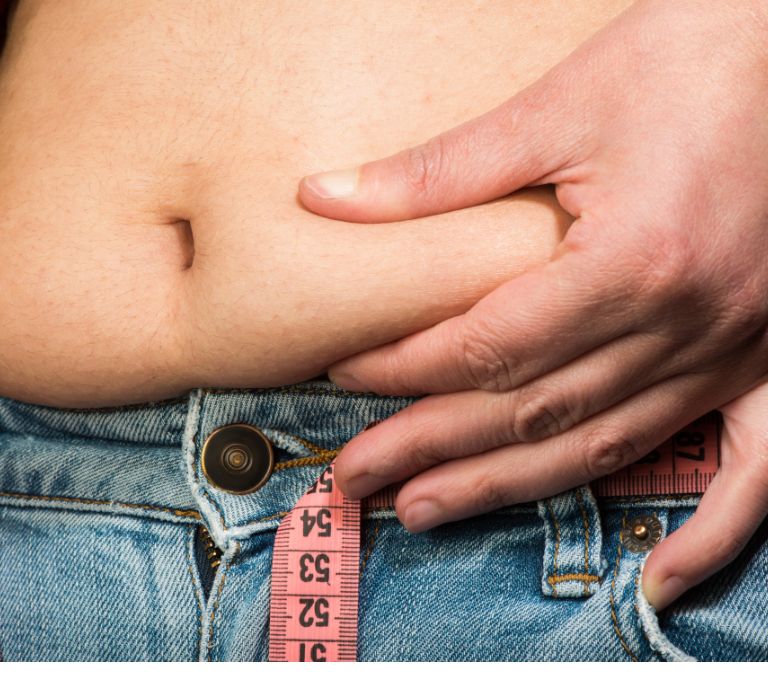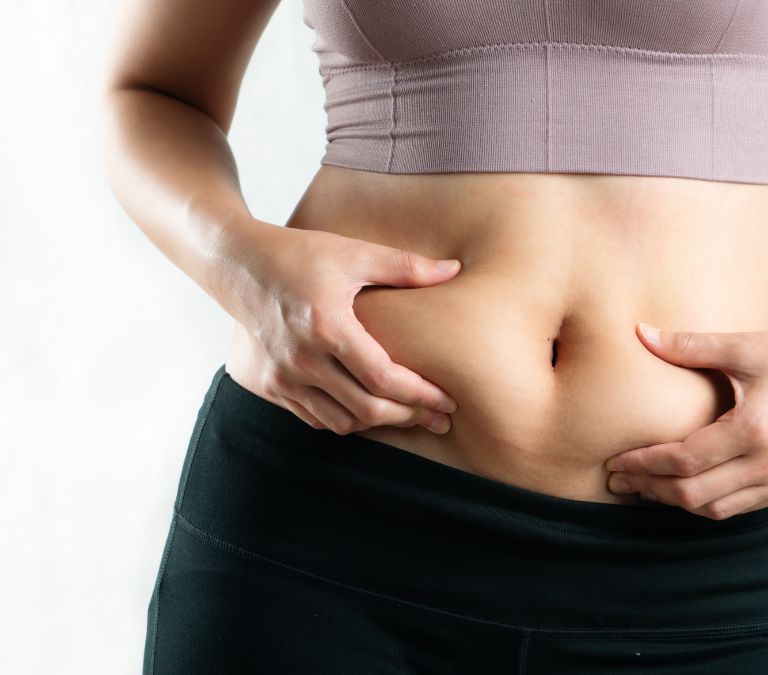So many things happen during menopause. The primary symptom is the loss of fertility, and many other symptoms are also associated. From hot flashes to night sweats, loss of sleep to weight gain, and even bloating, the period of menopause can come with so many complications.
Some of these symptoms are very severe, while others are relatively mild. Most of these symptoms experienced during menopause are caused by hormonal changes and fluctuations. As women age, the production power of certain hormones in the body begins to decline, which can cause negative effects on the body. So, is there any connection between menopause and bloating?
Understanding Bloating
Tightness, fullness, or swelling of your abdominal area due to trapped gas or fluid in the gastrointestinal tract. That’s bloating.
You must have heard or used the word “bloating” at least once in your life. Most times, we say we are bloated when we feel full. Maybe you drank two glasses of water and somehow became sure that you were bloated. Sometimes, being bloated is normal. However, there is a thin line between having a full stomach from food or stool and having a full stomach from gasses and fluid. While constipation and gut sensitivity remain the most common reason for being bloated, hormonal changes could also trigger it (no surprises there).
Bloating is common in older women for a reason hence menopause and bloating is a hot topic among most menopausal women. So many women in the mid-ages of their lives tend to complain of an increase in the size of their stomachs. They often link it to having too much to eat or a normal thing every woman goes through. However, studies have shown that menopause could trigger bloating in women.
“Then why does your stomach look all big and round?”

“Do you know that the United States is not the world’s biggest country?” Lily asked as she scribbled something in her notebook.
“What is it then?” Neville, my eldest sister, asked as she carefully placed eight candles on a chocolate cake.
“I don’t know… Mrs. Dunlop didn’t go further. She just said it and left the class.”
All this while, I was on the couch, eating chips and thinking of how the day would be. Then, I checked the time, it was 10 am on Sunday 14th of December 2021, and we were all excited to celebrate Lily’s eighth birthday.
“Well, would you like to know what it is?” Neville asked again
“Nope. I don’t think it’s important. And I’m just eight. Maybe Kate will need it.”
“I know what the largest country on earth by landmass is, so you don’t have to tell me,” Kate said, with her total concentration on her phone.
Kate didn’t know the answer to the question…. Obviously. You could tell she was already trying to get the answer on Google. A few seconds later… “It’s China” she yelled, feeling fulfilled and accomplished. “No, Kate, the correct answer is Russia. China is the largest country by population, while Russia is the largest country by landmass.” Get it now? Neville asked, and you could tell Kate was still trying to confirm from her phone.
“So what is America doing to stop this domination by other countries?”
Whenever Kate asks questions, it leads to another, then another, until it becomes a mess.
I reached my hand into the bag, and I couldn’t feel any more chips. So I stood up to grab some more, and then Kate asked another question; “Speaking of size, is it just me, or is mom looking pregnant?”
Neville stopped what she was doing and looked at my tummy. It was very awkward. I was standing at the center of the sitting room, with all eyes fixed on my bulging tummy.
“Wait a minute….” Neville said as she came closer to me. “Aren’t you already in menopause?” she whispered.
“What? Nev… I’ve been in menopause for like 6 months now. Stop acting like you don’t know that”
“Then why does your stomach look all big and round?”
“As you can see, I had a big lunch,” I said as I lifted the bag to her face.
“Can you two speak louder? The whole family is interested in the conversation, too,” Kate said, giving my tummy an even closer look.
“It’s nothing… I’m perfectly fine.”
“well, I’d like to run some tests; it might be something really serious,” Neville said
“Oh, Neville… just because you’re a Doctor doesn’t mean you have to use me as your lab rat all the damn time. What could a big stomach mean other than overfeeding and weight gain?”
“You could have a disease with your liver, bloating, common weight gain, food intolerance, cancer, or something else.”
“Are you serious? All that for a big tummy?”
“Exactly… that’s why you should let me do my job.”
“Okay. Do what you have to do.”
Lily’s birthday went very well. It was packed with friends from her school and the neighborhood. During the party, I noticed that my stomach had become smaller again, and I was keen to tell Neville how wrong she was about the entire situation.
At about 4 pm, the party was over, and the house was empty again. As Lily opened her present, I was on my way to see Neville and show her my new small stomach – I looked down at my tummy, and it’s gone big again. Even bigger than it did some hours ago. What in the world is going on with my body?
I went to Neville, and she did some simple tests. All she did was feel my stomach and… “I think you’re going through bloating, likely caused by menopause.”
“How are you so sure?” I asked
“It’s quite clear. Your stomach is huge and strong, and you said it went down some hours ago, right? So I think it’s just bloating.”
“And how are you sure it’s caused by menopause?”
“You and I know you’re still in perimenopause. When was your last period?”
“That was like in July”
“Exactly! You have to go through 12 consecutive months of no periods before saying you’re in menopause. Right now, you’re still in perimenopause, and bloating is common during perimenopause.”
Menopause and Bloating – Why You May have Bloated Belly During Menopause

As stated in the opening paragraph, hormonal fluctuation is the leading cause of many complications experienced during menopause. The production and utilization power of Important hormones in the body, like estrogen, testosterone, and insulin, begins to change. These changes could, in turn, lead to complications like osteoporosis, insulin resistance, bloating, weight gain, heart disease, and even diabetes.
Firstly, it is good we know that there is a difference between bloating and weight gain. Menopausal women who experience bloating tend to figure out that it doesn’t last too long; it comes and goes. Also, menopausal women going through bloating must have realized that it worsens after eating. During menopause, there are two different types of bloating; one is caused by excess gas, while the other is caused by excess fluid. While these two are different in some ways, one thing remains very similar; they result in high levels of discomfort.
Studies have shown that bloating occurs more frequently in perimenopausal women than in menopausal women.
Perimenopause and Bloating
Perimenopause is the period leading to menopause. Menopause doesn’t just happen overnight. It takes a process that could last for several years. Generally, a woman is not diagnosed with menopause if she hasn’t experienced 12 consecutive months of no periods. This period of irregular periods is called perimenopause. At this phase, the ability of the ovaries to produce eggs begins to decline gradually and finally stops. Perimenopausal women are very likely to experience bloating caused by bodily fluid retention.
During perimenopause, the body’s hormones begin to change rapidly. With these changes, the body can experience heightened estrogen levels, the hormone responsible for developing secondary sexual characteristics in women. As the levels of estrogen increase, the body tends to retain more water than normal. With this, bloating is formed.
Menopause and Bloating
After periods cease for 12 consecutive months, menopause is automatically reached. In the United States, the average age for women to go into menopause is 52. Women who are already in menopause do not experience more severe symptoms than women who are in perimenopause. Studies have shown that bloating during menopause is more related to other factors than hormones. Menopausal women have more stable hormones than perimenopausal women. The further you age, the less likely you will have complications relating to menopause. Bloating during menopause is caused by built-in gas in the gastrointestinal tract, not fluids. Even in perimenopausal women, changes in hormonal levels aren’t the only cause of bloating.
Other Bloating-triggering Factors in Menopausal Women
- · Slowed digestion
- · Swallowing air
- · Exercise
- · Smoking
- · Gut sensitivity
- · Small intestinal bacterial overgrowth
- · Gastroparesis
- · Gynecological conditions
- · Diet
- · Menopausal stress
- · Some other health conditions
Difference between Bloating and Weight Gain during Perimenopause and Menopause
Bloating is not the same as weight gain. So many people today, especially women, tend to label any little belly fat as a sign of weight gain. When they check the mirror and notice the slightest increase in the size of their stomach, they quickly attribute it to a sign of some added kilos. While an increase in belly size usually characterizes weight gain, knowing that a swollen belly could also be a sign of bloating is important; not every increase in the belly results from fat accumulation. Both weight gain and bloating are symptoms of menopause.
Some differences between bloating and weight gain include:
Fluctuating Belly Size
Unlike weight gain, bloating doesn’t increase the size of the belly for very long periods. During bloating, the belly size increases for some time and then decreases afterward. If you feel full at certain periods of the day and then empty at some other time, you could be going through bloating and not weight gain. This fluctuation in belly size usually happens during periods. If you are experiencing weight gain, the size of your belly stays big all the time or for a long time. However, it is important to know that bloating is not a constant companion but could stay as long as menopause.
Hard Stomach
Generally, the human stomach is soft and spongy. Even during weight gain, it remains so. However, the stomach becomes very hard during bloating. The retained water or gas has expanded the stomach to a point where it becomes extra tight. This tightness causes the unusual hardness of the abdomen. If your stomach becomes large, tight, and hard, you will likely go through bloating, not weight gain. Knowing just how hard the stomach is, you can use the pressure test. The pressure test involves pressing the stomach, focusing on the swollen region. If the stomach feels tough when the pressure is applied, you are bloated.
Bulgy Stomach
During weight gain, all parts of the body are evenly affected. For example, when you check in the mirror, the size of the hands complements the size of the legs and the stomach. If only the body’s abdominal region experiences an increase, then you probably are bloated.
Treatment and Prevention of Bloating
Bloating can be reduced simply by making some lifestyle adjustments. Some ways of preventing or reducing bloating are:
Exercising Regularly

Every woman who wishes to thrive on earth for a long time must undergo menopause. Unfortunately, the stage of menopause comes with it some symptoms that, although mild, can be fatal in some women. But, according to studies, women who do not engage in any form of physical activity will suffer more from these symptoms.
Suppose you are a woman going through menopause and spend most of your day doing nothing. In that case, you become susceptible to numerous negative effects of menopause. For this reason, most women going through menopause today, and are frequent visitors of the hospital, are women who do not engage in physical activities. I’m not telling you to be an athlete overnight; I’m saying that as women, we should try to embrace the culture of activeness and suppress anything that will make us idle. While this will not be easy, remember that menopause increases your risk of heart problems, and exercises lower the risks.
Exercises help prevent bloating, but they also help manage up to 80% of menopausal symptoms. In post-menopause, the body’s estrogen levels drop, which causes a decrease in the bone density of the skeletal system. The abrupt drop in the level of this hormone increases your risk of osteoporosis, which is the weakening of the bones. Therefore, staying active can help breed healthier bones. In addition, routine exercise makes the bones stronger and resistant to easy fracture and tears.
According to research, deliberately engaging in physical activity can help relieve stress and lift us emotionally. When we engage in exercises, the brain secretes so many chemicals that are capable of making us feel happier. With this, our general confidence level can be increased, and our self-esteem can be greatly improved, something all menopausal women need.
Making Diet Changes
Highly spicy and sugary foods should be limited. You should also avoid high-fat foods, alcoholic beverages, and cigarettes.
Some foods that trigger bloating are beans, wheat, garlic, asparagus, onions, and wheat. Also, milk and other dairy foods can cause bloating in lactose-intolerant women. These foods trigger menopausal symptoms like hot flashes, night sweats, weight gain, bloating, and even heart diseases. So, with all these, some may ask what food should be eaten more by women going through the postmenopausal phase of life.
As some foods can aggravate menopausal symptoms like bloating, some food should also be able to reduce their effects. Thankfully, various good and nourishing food products are to be embraced throughout your postmenopausal phase of life. Antacid foods such as sweet potatoes, beets, carrots, and green vegetables like broccoli, asparagus, and green beans, are good diet options to help manage bloating during menopause.
Avoid foods high in fiber. Fiber can cause a lot of gas to build in the stomach. If you’re going to eat fiber, then eat it in moderation. Also, it is important to drink a lot of water. While this may sound funny, considering how fluid retention is the major cause of bloating, taking in a lot of water can help your body get rid of excess sodium. Eating foods high in sodium will make our body hold onto fluids. We should avoid foods that are too spicy.
Medication
Anti-bloating Medication
A variety of pills and supplements are now available to help you deal with the problem of bloating. Some include probiotics, psyllium, vitamin D, and cinnamon oil.
Menopausal Hormone Therapy
Abbreviated as HRT, menopausal hormone therapy can help relieve bloating during menopause by replacing hormones at lower levels. It is known that bloating in menopausal women is caused by hormonal fluctuation. What HRT does is that it helps the body balance its level of vital hormones like estrogen and progesterone.
When these hormones are in little circulation, it can lead to symptoms like weight gain and bloating. HRT is typically taken to reduce the effects of menopausal symptoms on women going through menopause. HRT helps replace hormones that have become low as a result of menopause.
With this, there tends to be some hormonal balance in the body. The fluctuations of vital hormones in the body of menopausal women are the main reasons for so many uncomfortable menopausal symptoms. With HRT, symptoms like hot flashes, night sweats, reduced sex drive, vaginal dryness, and mood swings can be relieved. HRT can also help with osteoporosis problems, which are very common in the postmenopausal phase of life.
Water-reduction Pills
These pills will help your kidneys eliminate excess salt and water from your body. The salt and water are converted into urine and taken out of the body.
When to See a Doctor

Generally, bloating is considered common and mild. The only thing bloating does to the body is provide some discomfort. However, bloating could be caused by circumstances requiring urgent medical attention.
Suppose you experience bloating coupled with rapid and drastic changes in weight and bowel movements. In that case, you should speak to your doctor immediately. You could be going through some serious underlying condition. Bloating doesn’t last long.
If you experience bloating for as long as a few days, then it is high time you see a doctor. If you find it very difficult to pee and your poo looks black, you should see a doctor as soon as possible. Some other conditions that should make you see a doctor while experiencing bloating include:
- · Abdominal pain
- · Vomiting
- · If you have blood in your poo
- · Unexplained weight loss
- · Difficulty swallowing anything
- · Loss of appetite
- · If you get full easily
- · A lump in your tummy
- · Unusual bleeding from the vagina
- · If you’re above 50
- · Jaundice (yellowing of the skin and white of the eye)
- · High temperature
- · Diarrhea
Women should be very concerned with their health, especially during menopause. For every little change, we notice in the body, making more inquiries with a doctor or other medical practitioners should be our primary line of action.







